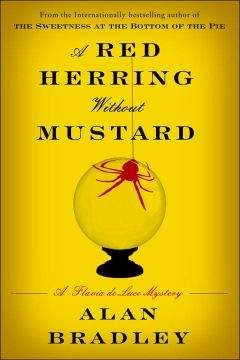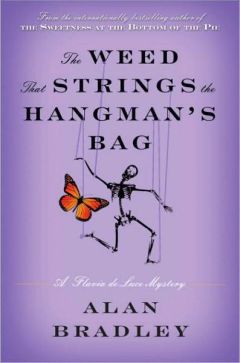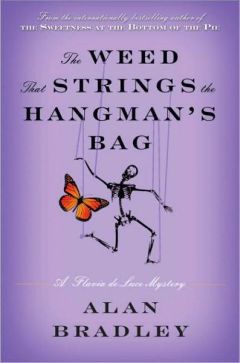Alan Bradley - A Red Herring Without Mustard: A Flavia de Luce Novel

Скачивание начинается... Если скачивание не началось автоматически, пожалуйста нажмите на эту ссылку.
Жалоба
Напишите нам, и мы в срочном порядке примем меры.
Описание книги "A Red Herring Without Mustard: A Flavia de Luce Novel"
Описание и краткое содержание "A Red Herring Without Mustard: A Flavia de Luce Novel" читать бесплатно онлайн.
Better not touch it, I thought. Best leave it in place for Inspector Hewitt’s men. Besides, I already knew as much as I needed to know about this particular remnant of the crime.
With a couple of halting steps, I limped towards an open tunnel.
But wait! Which of these openings would lead me back to Colin?
The one on the left, I thought, although I could hardly be sure. Lucius de Luce’s plan had shown a bewildering maze of subterranean waterworks, and only now that I thought about it did I remember shoving the folded map into my pocket.
I grinned, realizing that help was right here at my very fingertips. But when I reached for it, my pocket was empty.
Of course! I had changed my dusty dress for a clean one, and I let slip a mental curse as I realized that Lucius’s priceless hand-drawn map was, at this very moment, soaking its way to blankness in a laboratory sink!
There was nothing for it now but to follow my instincts and choose a tunnel: the one on my left.
Here at its eastern extremity, the corridor was not only lower and more narrow, but had fallen into scandalous disrepair. The brick walls and pieces of the roof had crumbled in places, covering parts of the floor with broken rubble.
Careful, I thought. The whole thing might cave in and—
Something slapped my face—something dangling from the roof like a dead white arm. I let out a little yelp and stopped in my tracks.
A root! I had been frightened by a stupid root that had been put down, perhaps by one of the long gone borders which had, in earlier times, shaded the walkways of the Visto.
Even though I ducked under the thing, its slimy finger still managed to caress my face, as if it were dying for want of human company.
I limped along, the light of the torch sweeping wildly in front of me.
Here, on both sides of the tunnel, a dusty assortment of ladders, ropes, pails, watering cans, and galvanized funnels had been left, as if the groundskeepers who had used them had wandered off to war and forgotten to return.
A sudden flash of red brought me to a stop. Someone had written on the wall. I let the light play slowly over the painted letters: H.d.L.
Harriet de Luce! My mother had been here before me—found her way through this same tunnel—stood on these same bricks—painted her initials on the wall.
Something like a shiver overtook me. I was surrounded with Harriet’s presence. How, when I had never known her, could I miss her so deeply?
Then, faintly, from far along the tunnel, there came to my ears the sound of a voice—singing.
“London Bridge is fallin’ down … my fair lady.”
“Colin!” I shouted, and suddenly my eyes were brimming. “Colin! It’s me, Flavia.”
I lurched forward, tripping over fallen stones, feeling the ooze in my shoes from the tunnel’s seepage. My hands were raw from clutching at the rough wall for support.
And then, there he was …
“My fair lady,” he was singing.
“It’s all right, Colin. You can stop now. Where’s the key?”
He winced at the light, then stared at me with a strange, offended look.
“Untie me first,” he said gruffly.
“No—key first,” I said. “That way you won’t run off with it.”
Colin groaned as he rolled slightly onto his left side. I reached into his pocket—Ugh!—and pulled out an iron key.
As he twisted, I could see that Colin’s wrists were bound firmly behind him and lashed to an iron pipe that rose up vertically before vanishing into the roof.
The poor creature could have been tied up here for days!
“You must be in agony,” I said, and he looked up at me again with such blank puzzlement that I wondered if he knew the meaning of the word.
I struggled with the knots. Colin’s efforts to free himself and the moisture from the seeping walls had shrunken them horribly.
“Do you have a knife?”
Colin shook his head and looked away.
“What? No knife? Come on, Colin—Boy Scouts are born with knives.”
“Took it off me. ‘Might hurt yourself.’ That’s what they said.”
“Never mind, then. Lean forward. I’ll try the key.”
Putting the torch on the ground so that its light reflected from the wall, I attacked the knots with the business end of the key.
Colin groaned, letting out little yelps every time I applied pressure to his bonds. In spite of the clamminess of the tunnel, sweat was dripping from my forehead onto the already saturated rope.
“Hang on,” I told him. “I’ve almost got it.”
The last end pulled through—and he was free.
“Stand up,” I said. “You need to move around.”
He rolled over, unable to get to his feet.
“Grab hold,” I said, offering my hand, but he shook his head.
“You have to get your circulation going,” I told him. “Rub your arms and legs as hard as you can. Here, I’ll help you.”
“It’s no good,” he said. “Can’t do it.”
“Of course you can,” I said, rubbing more briskly. “You need to get some circulation into your toes and fingers.”
His lower lip was trembling and I felt a sudden surge of pity.
“Tell you what. Let’s have a rest.”
Even in the half-light his gratitude was hard to miss.
“Now then,” I said. “Tell me about the blood on the fountain steps.”
Perhaps it wasn’t fair, but I needed to know.
At the word “blood,” Colin shrank back in horror.
“I never done it,” he croaked.
“Never did what, Colin?”
“Never done Brookie. Never shoved that sticker in his nose.”
“He roughed you up, didn’t he? Left you no choice.”
“No,” Colin said, managing somehow to pull himself to his feet. “It weren’t like that. It weren’t like that at all.”
“Tell me what happened,” I said, surprised by my own coolness in what could prove to be a tricky situation.
“We was chums, Brookie an’ me. He told me stories when we wasn’t scrappin’.”
“Stories? What kind of stories?”
“You know, King Arthur, like. ’Ad some right lovely talks, we did. Used to tell me about old Nicodemus Flitch, an’ ’ow ’e could strike a sinner dead whenever ’e took the notion.”
“Was Brookie a Hobbler?” I asked.
“ ’Course not!” Colin scoffed. “But ’e wished ’e was. ’E fancied their ways, ’e used to say.”
So there it was: I should have asked Colin in the first place.
“You were telling me about the sticker,” I said, trying to steer Colin gently back to the moment of Brookie’s death.
“He showed it to me,” Colin said. “Ever so pretty … silver … like pirate treasure. Dug it up behind your ’ouse, Brookie did. Goin’ to make dozens of ’em, ’e said. ‘Enough for a garden party at Buckin’ham Palace.’ ”
I dared not interrupt.
“ ‘Give it ’ere,’ I told ’im. ‘Let’s ’ave a gander. Just for a minute. I’ll give it back.’ But ’e wouldn’t. ‘Might stab yourself,’ ’e said. Laughed at me.
“ ‘ ’Ere, you promised!’ I told ’im. ‘You said we’d go halfers if I carried the dog-thing.’
“I grabbed it … didn’t mean nothin’ by it—just wanted to have a gander, is all. ’E grabbed it back and gave it such a tug! I let go too quick, and—”
His face was sheer horror.
“I never done it,” he said. “I never done it.”
“I understand,” I said. “It was an accident. I’ll do whatever I can to help, but tell me this, Colin—who tied you up?”
He let out such a wail that it nearly froze my blood, even though I already knew the answer.
“It was Tom Bull, wasn’t it?”
Colin’s eyes grew as round as saucers, and he stared over my shoulder. “ ’E’s comin back! ’E said ’e’d be back.”
“Nonsense,” I said. “You’ve been here for ages.”
“Goin’ to do me, Tom Bull is, ’cause I seen what ’e done at the caravan.”
“You saw what he did at the caravan?”
“ ’Eard it, anyhow. ’Eard all the screamin’. Then ’e come out an’ tossed somethin’ in the river. ’E’s goin’ to kill me.”
Colin’s eyes were wide as saucers.
“He won’t kill you,” I told him. “If he were, he’d have done it before now.”
And then I heard the sound behind me in the tunnel.
Colin’s eyes grew even larger, almost starting from their sockets.
“ ’E’s ’ere!”
I whipped round with the torch to see a hulking form scuttling towards us like a giant land crab: so large that it nearly filled the passageway from roof to floor, and from wall to wall; a figure bent over nearly double to negotiate the cramped tunnel.
It could only be Tom Bull.
“The key!” I shouted, realizing even as I did so that it was in my hand.
I sprang for the lock and gave the thing a twist.
Damn all things mechanical! The lock seemed rusted solid.
No more than a dozen paces away, the huge man was charging along the tunnel towards us, his rasping breath now horribly audible, his wild red hair like that of some raging madman.
Suddenly I was shoved aside. Colin snatched the key from my hand.
“No, Colin!”
He rammed it into the lock, gave it a fierce twist, and the hasp sprang open. A moment later he had yanked open the gate and pushed me—dragged me—almost carried me—through.
He slammed shut the gate, snapped the lock closed, and pushed me well away from the bars.
“Watch this un,” he said. “ ’im’s got long arms.”
For a moment, Colin and I stood there, breathing heavily, looking in horror at the blood-engorged face of Tom Bull as it glared at us from behind the iron bars.
His great fists grasped the heavy gate, shaking it as if to rip it out by the roots.
The Red Bull!
Fenella had been right!
I jerked back in horror against the wet wall, and as I did so, my twisted ankle gave way and I dropped the torch.
We were plunged instantly into inky blackness.
I dropped to my knees, feeling the wet floor with outstretched fingers.
“Keep clear of the bars,” Colin whispered. “Else ’e’ll grab you!”
Not knowing which way was which, I scrabbled in the darkness, fearful that at any instant my wrist would be seized.
After what seemed like an eternity, the back of my hand brushed against the torch. I closed my fingers around it … picked it up … pushed the switch with my thumb … nothing.
I gave it a shake—banged it with the heel of my hand … still nothing.
The torch was broken.
I could have wept.
Close to me, in the darkness, I heard a rustling. I dared not move.
I counted ten heartbeats.
Then there came a scraping—and a match flared up.
“ ’Ad ’em in my pocket,” Colin said proudly. “All along.”
“Go slowly,” I told him. “That way. Don’t let the match go out.”
As we backed away from the gate into the tunnel, and Tom Bull’s face faded into darkness, his mouth moved and he uttered the only words I ever heard him speak.
“Where’s my baby?” he cried.
His words echoed like knives from the stone walls.
In the horrid silence that followed, we edged farther back along the tunnel. When the first match burned out, Colin took out another.
“How many of those do you have?” I asked.
“One more,” he said, and he lit it.
We had gained some ground, but it was still a long way to the cellars.
Colin held his last match high, moving slowly again, leading the way.
“Good lad,” I told him. “You’ve saved us.”
A sudden gust of cold air blew out the match, and we were plunged once again into blackness.
“Keep moving,” I urged him. “Follow the wall.”
Colin froze.
“Can’t,” he said. “I’m ’fraid of the dark.”
“It’s all right,” I told him. “I’m with you. I won’t let anything happen.”
I pushed against him, but he would not be budged.
“No,” he said. “Can’t.”
I could have gone on without him, but I was incapable of leaving him here alone.
And slowly, I realized that somehow, even in the darkness, I could dimly see Colin’s white face. A moment later, I became aware of a growing light that had suddenly filled the passageway.
I spun round, and there, to my amazement, was Dogger, holding a large lantern above his head. Porcelain peered round him, fearfully at first, and then, when she saw I was quite safe, running to me, almost crushing me in her embrace.
“I’m afraid I ratted on you,” she said.
THIRTY
“AND DOGGER, YOU SEE, had already latched the door at the fountain. It only opens from the outside, so there was no way Tom Bull could get out.”
“Well done, Dogger,” Father said. Dogger smiled and gazed out the drawing-room window.
Daffy shifted uneasily on the chesterfield. She had been torn away from her book by Father, who insisted that both she and Feely be present at the interview. It was almost as if he was proud of me.
Feely stood at the chimneypiece, pretending to be bored, stealing quick, greedy glances at herself in the looking glass while otherwise simpering at Sergeant Graves.
“This whole business about the Hobblers is intriguing,” Inspector Hewitt said. “Your notes have been most helpful.”
I fizzed a little inside.
“I gather they’ve been carrying out their baptisms in the Gully since sometime in the seventeenth century?”
I nodded. “Mrs. Bull wanted her baby baptized in the old style, and her husband, I think, probably forbade it.”
“That he did,” said Sergeant Graves. “He’s told us as much.”
The Inspector glared at him.
“She went to the Gully with Miss Mountjoy—Dr. Kissing saw them together. There might have been other Hobblers present, I really don’t know.
“But something went horribly wrong. They were dipping the baby by the heel, as Hobbler tradition requires, when something happened. The baby slipped and drowned. They buried it in the Palings—swore to keep the truth to themselves. At least, I think that’s what happened.”
Sergeant Graves nodded, and the Inspector shot him such a look!
“Mrs. Bull thought at once of blaming it on Fenella. After all, she had just passed the caravan in the lane. She went home and told her husband, Tom, that their baby had been taken by Gypsies. And he believed her—has gone on believing her—until now.”
I took a deep breath and went on. “Fenella told Mrs. Bull’s fortune at the fête last week—told her the same nonsense she tells everyone: that something was buried in her past—something that wanted digging out.”
Only at that instant, as I spoke, did the full force—the full aptness—of Fenella’s words come crashing into my consciousness: “Told her there was something buried in her past; told her it wanted digging out—wanted setting right.” I had actually copied these words into my notebook without understanding their meaning.
Подписывайтесь на наши страницы в социальных сетях.
Будьте в курсе последних книжных новинок, комментируйте, обсуждайте. Мы ждём Вас!
Похожие книги на "A Red Herring Without Mustard: A Flavia de Luce Novel"
Книги похожие на "A Red Herring Without Mustard: A Flavia de Luce Novel" читать онлайн или скачать бесплатно полные версии.
Мы рекомендуем Вам зарегистрироваться либо войти на сайт под своим именем.
Отзывы о "Alan Bradley - A Red Herring Without Mustard: A Flavia de Luce Novel"
Отзывы читателей о книге "A Red Herring Without Mustard: A Flavia de Luce Novel", комментарии и мнения людей о произведении.






